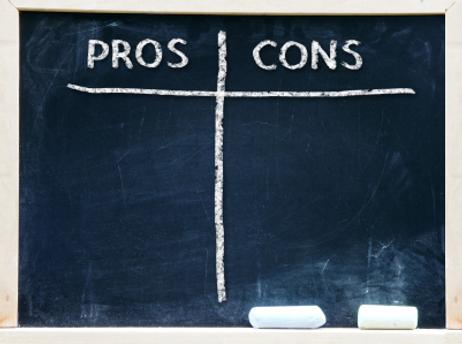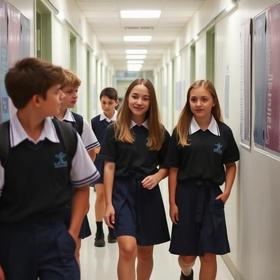There are few topics as fiercely debated in the world of education today as school choice and voucher programs. The subject becomes particularly prevalent in areas where public schools are not making the grade but has also been seen in districts where the public schools are performing well. However, parents want more opportunities and choices for their children. No matter what side of the fence a parent or educator might be on, chances are the emotions surrounding this topic run high. We’ll take a closer look at the school choice idea, including the history of the programs and the pros and cons that make this issue one of the hot-button subjects around the country.
Which School to Choose?
One reason school choice has become a major point of contention is because there are many options in education today. Districts offer a wide range of school types, and parents are faced with choices they may not have had just a few decades earlier. Some of the schools seen in communities today include:
Neighborhood Public Schools
Public schools are funded by the government and must follow specific guidelines set forth by state regulators. They are accessible to all children and are close to homes in the neighborhood, making them easy for children to attend. District zoning regulations typically assign schools, although some districts allow students to attend another public school outside their immediate neighborhood if there is sufficient space in the school for that student.
Charter Schools
Charter schools are also public schools, so no tuition is required. However, these schools are not set up by the state but are established independently through teachers, parents, and community members. The schools are not subject to the same state and federal requirements that govern other public schools but are held to a high accountability level regarding their performance. Parents must request that their children be enrolled in the school, and high parental involvement is strongly encouraged at most charters.
Magnet Schools
Magnet schools are also public schools without tuition requirements. These schools typically have a particular focus, such as science or the arts. In some cases, students may have to take a test to qualify for school enrollment; others allow for enrollment according to parental request alone.
Virtual Schools
Virtual schools, also called distance learning, are conducted via the Internet. Students usually take classes from the comfort of home and at their own pace. Virtual schools are subject to strict government and district guidelines to ensure students who choose this mode of instruction receive the same quality of education as those in the classroom.
Private Schools
Private schools can be religious or secular. These schools charge tuition to attend and are designed to support parental beliefs in how children should be educated, whether spiritual, academic, or otherwise. These schools are often the subject of the voucher debate since vouchers can be used to help pay the tuition at private schools.
Home Schools
With a home school, parents become the teachers and provide students personalized instruction customized to their own pace and learning style. Parents are subject to state rules to ensure students get a quality education similar to what they would receive in the classroom.
With many choices in education today, parents can select the style of schooling that is the best fit for their children. The school voucher program takes this further by offering parents additional funding to help them pay for the school of their choice.
The Idea Behind School Vouchers
School voucher programs work on the idea that parents should be able to choose the best school for their children rather than the state or local school district. These programs take the tax dollars that would typically pay for the public education system and give them directly to parents to pay for their children’s education as they see fit. Parents can take the funding and use it for private school tuition. Parents' funding is based on what the schools typically get for each student each school year. While the amount may not be sufficient to cover the total tuition cost of a private school for a year, the argument is that if parents do not have to pay into the public school system, they will be more likely to afford the type of education that they deem is best for their children.
School vouchers have a long history in this country, even though the debate over such programs has accelerated in recent years. According to a publication by the Economic Policy Institute, the idea of using public funding for private schooling dates back to the 1960s, when liberal academics began to argue that the racial inequalities in the current school system could not be adequately addressed through a residentially segregated public school system. These advocates of a fair and equal education system were clamoring for a voucher system, even during this time, to break the “monopoly” that public education had become. Although the debate at the time eventually fizzled out without seeing any real change to public school policy, the inequalities brought forth in these arguments continue to be a source of concern today.
This video explains what vouchers are.
The Pros of School Vouchers
Many arguments have been made in favor of school vouchers today. Some of these assertions include:
- School vouchers empower parents to make choices for their children based on their children’s unique needs, interests, and learning styles.
- School vouchers eliminate the need for parents to pay twice for their children’s education: once in tax dollars and again in tuition costs.
- School vouchers effectively meet children’s needs by allowing them to attend the school that best suits them rather than the one in their neighborhood.
- The government-run education system isn’t working; schools are failing, and students are falling through the cracks.
- A voucher system promotes competition between area schools, which raises the bar on the standard of education throughout all schools, including public schools.
- Vouchers offer students in low-income areas with poorly performing schools a chance at a better education and the opportunity to break the cycle of poverty.
Those favoring school vouchers may advocate for the system to complement the current public school system—or replace it entirely. On the other hand, those who believe that the government cannot manage the school system and support the complete privatization of schools nationwide.
The Cons of School Vouchers
While the potential benefits of school vouchers are great, there are many drawbacks to the system as well. Those who oppose a school voucher system often present the following arguments against vouchers:
- School vouchers take money away from the public school system, and budgets are currently so tight in many school districts across the country that additional cuts could seriously undermine the value of public education today.
- Because many private schools are religious, the allowance of using tax dollars to pay for private schools that subscribe to a particular faith is a blatant violation of the constitutional separation of church and state.
- Vouchers do not benefit all students since private schools can still pick and choose which students attend and could discriminate against sure students if they so choose.
- With more schools vying for tuition money, the quality of private schooling may suffer, leaving some parents paying out of pocket for a lesser education than they would get from public schools.
- School vouchers skim the best students away from the public school system, making it that much more difficult for public schools to make the grade on standardized test scores and get subsequent funding for higher scores.
- A school voucher system tends to divide the country, while public education serves to unite it.
While the pros and cons of school vouchers reach those heading to the voting booths to determine the future of schools in their area, not all of these arguments are weighted with cold, hard facts. Next, we’ll dispel some of the common myths that circulate about school choice and voucher programs.
Dispelling the Myths of School Choice
Some of the arguments made in favor of or opposing school choice and vouchers don’t hold much water when the facts are presented. It is essential to get the right information before determining whether a voucher program is the best choice for a specific community. According to a report in Time, some of the common myths of school voucher programs include:
Vouchers take the best students away from public schools.
Because many of the voucher programs introduced today are designed specifically for students from low-income families or special needs students, this myth does not appear to be based in fact. According to an op-ed piece in the Washington Post, research done on students transferring to charter schools showed that the students who made the move had similar or lower achievement levels to their peers prior to transferring.
Vouchers improve performance in some school districts.
While this statement seems like common sense – after all, competition typically increases quality in a free enterprise system – this theory doesn’t appear to transfer well to the public school system. The Times reports that voucher systems that have been in operation for some time in Milwaukee and Cleveland have not impacted the quality of public schools in those cities.
Vouchers take money away from the public school system.
While this statement might be true in some districts, it is not a given for every implemented voucher program. For example, an analysis of the voucher program in Milwaukee showed that vouchers save money on public education yearly. A voucher program in Washington, D.C., resulted in an infusion of federal funds into the public school system, eliminating concern over the impact of vouchers on school budgets.
Private schools always offer a better quality of education than public schools.
While some private and even charter schools may impress with their test scores and graduation rates, that doesn’t mean the private school down the street is a better fit for a specific child than the neighborhood public school. Parents need to weigh the pros and cons of each available school before making the best choice for their children.
Parents make better school choices for their children.
Finding the best fit in a school can take plenty of time and research – and not all parents can invest the effort to find the best school situation. Some don’t have the knowledge or background to know what criteria to evaluate when choosing a school. According to the Washington Post article, parents who chose a charter school for their children did not always select schools that performed better than the public schools in their neighborhood.
This video presents three lies about school choice.
Voucher Programs – Do They Work?
With so much information about school choice and voucher programs – and relatively few programs to look at to see if the system offers benefits – it can be challenging to know whether this approach to education will raise the bar on academic performance nationwide. Three voucher systems are going strong in Milwaukee, Cleveland, and Washington, D.C. There have been some bright spots in these areas. Washington, D.C., has managed to raise graduation rates through its school choice program, and data from Milwaukee shows a higher level of parental satisfaction with their children’s schools since the voucher program went into effect. In Cleveland, various studies on the benefits of vouchers provided conflicting results, so it is difficult to assess the actual outcome of this ongoing program.
With school choice continuing to be a hot topic for parents and educators nationwide, this subject is still one of the most debated in education circles. It may be some time before enough voucher systems are implemented to provide sufficient data to determine whether these programs can benefit the students they serve.
Questions? Contact us on Facebook. @publicschoolreview












